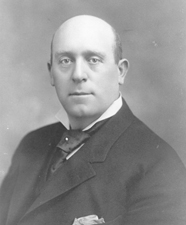Ollie Murray James (July 27, 1871 – August 28, 1918) was an American politician. A Democrat, he represented Kentucky in the United States House of Representatives and the United States Senate.
Ollie Murray James | |
|---|---|
 | |
| United States Senator from Kentucky | |
| In office March 4, 1913 – August 28, 1918 | |
| Preceded by | Thomas H. Paynter |
| Succeeded by | George B. Martin |
| Member of the U.S. House of Representatives from Kentucky's 1st district | |
| In office March 4, 1903 – March 3, 1913 | |
| Preceded by | Charles K. Wheeler |
| Succeeded by | Alben W. Barkley |
| Personal details | |
| Born | July 27, 1871 Marion, Kentucky, U.S. |
| Died | August 28, 1918 (aged 47) Baltimore, Maryland, U.S. |
| Political party | Democratic |
Biography
editJames was born and raised in western Kentucky. As a teenager he served as a page in the Kentucky General Assembly. James studied law and was admitted to the bar in 1891, beginning his practice that year.
In 1902 James sought and won election to the United States House of Representatives from Kentucky's 1st district, the far western part of the state. He was re-elected to the House four times, serving there from March 4, 1903, to March 3, 1913.[1] He was the Chairman of the Democratic National Conventions of 1912 and 1916.[2]
In 1912 James decided to give up his House seat to seek election to the United States Senate. He won that election in the Kentucky state legislature on 9 and 16 January 1912[3] and was sworn in on March 4, 1913. He served as chairman of the Senate Committee on Patents. His capabilities as a debater came to be recognized and feared in the Senate, as journalist and historian Claude G. Bowers observed:
More than six feet tall and large in proportion, with an immense head and a smoothly shaven face that reflected every feeling, and with a powerful voice that could absorb all other sounds, he would have been a commanding figure in any legislative assembly. In cold print his speeches lacked finish, but he relied on force, and his delivery accentuated the power of his argument. In debate he rode the whirlwind to direct the storm, overwhelming his opponent with ridicule when unable to combat him with logic. I always felt sorry for his victims.[4]
James died during his term of office in a hospital in Baltimore, Maryland on August 28, 1918.[5]
-
James K. Vardaman, James Thomas Heflin, and James in 1912
-
James and Justus Goebel at the 1912 Democratic National Convention
-
Ollie M. James, photo from the Harris & Ewing photo studio
See also
editReferences
edit- ^ "S. Doc. 58-1 - Fifty-eighth Congress. (Extraordinary session -- beginning November 9, 1903.) Official Congressional Directory for the use of the United States Congress. Compiled under the direction of the Joint Committee on Printing by A.J. Halford. Special edition. Corrections made to November 5, 1903". GovInfo.gov. U.S. Government Printing Office. 9 November 1903. p. 37. Retrieved 2 July 2023.
- ^ KY:Historical Society – Historical Marker Database – Search for Markers Archived 2007-10-13 at the Wayback Machine at kentucky.gov
- ^ Rhoades, Henry Eckford (1838). "The Tribune almanac and political register".
- ^ Claude G. Bowers, My Life: The Memoirs of Claude Bowers, pp.71-72 (New York: Simon & Schuster 1962) (retrieved Jul.21, 2024).
- ^ "Picturesque Kentuckian Succumbs to Kidney Disease in Baltimore at 47 Years". New York Times. August 29, 1918. Retrieved 2009-02-02.
Senator Ollie M. James of Kentucky, died at Johns Hopkins Hospital at 6:45 A.M today of an acute affection of the kidneys. Mrs. James and the Senator's brother, E.H. James, were with him when the end came.
External links
edit- Ollie Murray James from the Library of Congress at Flickr Commons
